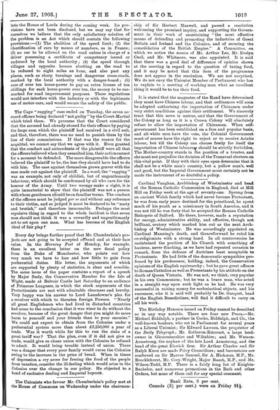The Cape " ragging" case ended on Tuesday, the seven
ac- cused officers being declared " not guilty " by the Court-Martial which tried them. We presume that the Court considered that the accused had already atoned for their offence by paying the large sum which the plaintiff had received in a civil suit, and that, therefore, there was no need to punish them by the loss of their commissions. If that was the reason for the acquittal, we cannot say that we agree with it. Even granted that the conduct and antecedents of the plaintiff were all that the officersbelieved when they assaulted him, their action cannot for a moment be defended. The more disagreeable the officers believed the plaintiff to be, the less they should have had to do with him. The case against themselves grows graver with the case made out against the plaintiff. In a word, the " ragging " was an example, not only of childish, but of ungentlemanly behaviour, which should be condemned by all who care for the honour of the Army. Until two wrongs make a right, it is quite immaterial to show that the plaintiff was not a person with whom gentlemen should be on familiar terms. The conduct of the officers must be judged per se and without any reference to their victim, and so judged it must be declared to be "nasty and brutish," and therefore inexcusable. Perhaps the most repulsive thing in regard to the whole incident is that seven men should not think it was a cowardly and ungentlemanly act to set upon one man. What has become of the English ideal of fair play ?






















































 Previous page
Previous page